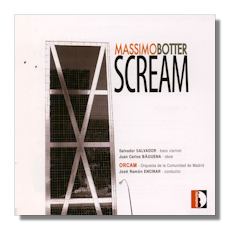
The Internet's Premier Classical Music Source
Related Links
- Latest Reviews
- More Reviews
-
By Composer
-
Collections
DVD & Blu-ray
Books
Concert Reviews
Articles/Interviews
Software
Audio
Search Amazon
Recommended Links
Site News
 CD Review
CD Review
Massimo Botter

Scream
- Sentiero in un deserto di lava 1
- Seven Blades
- And at the end… the scream 2
- Zéula
1 Salvador Salvador, bass clarinet
2 Juan Carlos Báguena, oboe
Orquestra de la Comunidad de Madrid/José Ramón Encinar
Stradivarius STR33845
Massimo Botter is a young composer (born in 1965) from Milan. Having completed his course of composition studies at the Giuseppe Verdi Conservatory in that city in 1996, he immediately went on to win a multitude of competitions, attract more than the normal number of commissions, (festival) residences and generate high-profile performances of his music, the frequency and credibility of which attest to his energy and enthusiasm. This CD on the Stradivarius label re-inforces his determination to be heard… as does its title!
Scream is a collection of four pieces with soloists Salvador Salvador (bass clarinet), Juan Carlos Báguena (oboe) and the Orquestra de la Comunidad de Madrid conducted by José Ramón Encinar. They're vigorous works – violent at times. There's sufficient variety, inventiveness and sheer musicality for these performers to work with to make this an interesting (though somewhat short at under 50 minutes) and memorable collection.
Sentiero in un deserto di lava ("Path in a lava desert") is the longest work at just over a quarter of an hour and sets the scene: it's effectively a short concerto for bass clarinet, commissioned by the 2006 Venice Biennale. There's projection without excessive angularity, many corners without a hint of disorientation, and contrasting textures throughout which avoid loss of focus. Indeed, one of Botter's strengths is an acute sense of direction and structure: nothing is haphazard; in his music's vibrancy is direction. And Salvador's playing is every bit as pointed and trenchant. It's a live recording.
Seven Blades is the most recent of Botter's works on this CD, having been completed in 2008. It's a true chamber piece which expands only with percussion the familiar Pierrot Ensemble line up; though there is no vocalist. It's a modern Via crucis but with seven stations on the Red Line of the Milan underground metropolitan railway. Whether this is sarcastic or more reverently allusive is hard to tell; in a way it hardly matters for the music certainly conveys trial and hardship – even those of the daily commute. Significantly, the seven members of the Orquestra de la Comunidad de Madrid abandon any whiff of narrative: this is almost impressionistic music where the timbres, dynamics and subtly-changing textural combinations make their point. A bit of a tour de force by the musicians. And one well worth it.
The same can be said of And at the end… the scream,which combines aspects of the other two works: it's also for a wind soloist (Juan Carlos Báguena's invigoratingly-played oboe) and twice as many (14) instrumentalists. It's less of a concerto in the way that Sentiero in un deserto di lava is – in part because the delicacy of the oboe is made to articulate a kind of "companionship" with the other players and in part because its melodic line is much more impressionistic. Again, the soloist's playing is fully in accord with Botter's intentions.
Zéula is from ten years earlier, 1996. It's both more conventionally symphonic and diatonic, perhaps characteristics one might expect from a beginning composer. But it's in no way a derivative or primitive piece. It's more melodic, somewhat gentler, perhaps, and seems to want to create less of a stir. It makes an interesting end to the CD, which has been carefully structured to suggest the musical progress of the composer. There is only one other CD containing works by Botter in the catalog – also on Stradivarius (33635) so Scream, which is closely and atmospherically recorded (the nature of instruments' sounds makes that important) and has an informative booklet containing background, biographies and photographs etc, such a valuable one. Botter's music, everyone involved seems to be saying, is original and accomplished enough to be here to stay and will be heard more of. From the evidence of Scream that seems undeniable.
Copyright © 2011, Mark Sealey.





















